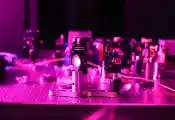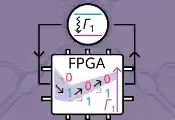FAU Physics Receives Over 900,000 Euros in Funding for Pioneering Project
January 09, 2025 -- A quantum computer the size of a smartphone – researchers at Friedrich-Alexander-Universität Erlangen-Nürnberg (FAU) are investigating how this could become reality. Physicist Prof. Dr. Vojislav Krstić and his team of researchers are focusing on developing quantum bits (Qubits) that work on the basis of topological isolators, a class of materials that have increasingly become the focus of research over recent years thanks to their unusual properties. The pioneering project has now received funding of over 900,000 euros.
From medical applications to artificial intelligence (AI), quantum computers suitable for everyday life could considerably accelerate a number of processes. However, all models to date have one crucial stumbling block: they only work at extremely low temperatures. “That is due to the quantum bits, also known as qubits, that control the computer and can take on several states at one time. These qubits allow quantum computers to attain high levels of computing power. Conventional qubits only work at temperatures just above absolute zero, that is approximately -273 degrees Celsius,” explains Prof. Dr. Vojislav Krstić from the Institute of Condensed Matter Physics. This is the reason why quantum computers currently still have to be cooled using complex processes in large facilities. “In order to integrate quantum computers into everyday life, we have to find electrically addressable qubits that still work stably at higher temperatures,” Krstić explains. That would not only make the devices smaller and more affordable, it would also considerably reduce their energy consumption.
The search for the qubit of the future
The research project therefore focuses on topological isolators, a class of materials that are not affected by external influences and that are capable of transmitting information in a particularly reliable manner. These topological isolators have the potential to revolutionize quantum computing. Until now, they have predominantly been investigated at the macroscopic scale, i.e. at a scale visible to the human eye. “If we now reduce the structure of these materials to only a few nanometers in size and break specific symmetries, this will change their energetic properties and we should be able to use them as qubits,” Krstić explains. The researchers have to break the symmetries of the material in such a way that it remains stable at the same time as having the required properties for being used in quantum computers. “That is a major challenge. However, if it leads to us finding a qubit that works at higher temperatures, that would be an exciting breakthrough. For example, quantum computers could be integrated into cars to regulate energy supply.”
About the research project
The research project will be funded at FAU for two years and hopes to make a decisive contribution to driving forward international research in the area of quantum computing. The funding will be used predominantly to cover staff costs and for special equipment and consumables. The work conducted by Krstić and his team may not only revolutionize technology but also contribute to using resources more sustainably, a crucial advantage in times of climate change. Quantum computers that require less complex cooling procedures would not only be more environmentally friendly, but could also be used in any number of locations, from a laptop on a desk to AI in the medical sector.




































